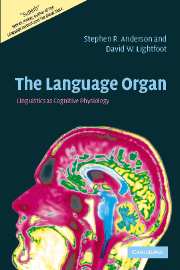Book contents
- Frontmatter
- Contents
- Preface
- 1 Studying the human language faculty
- 2 Language as a mental organ
- 3 Syntax
- 4 Sound patterns in language
- 5 Describing linguistic knowledge
- 6 Phonetics and the I-linguistics of speech
- 7 Morphology
- 8 Language change
- 9 “Growing” a language
- 10 The organic basis of language
- References
- Index
8 - Language change
Published online by Cambridge University Press: 03 December 2009
- Frontmatter
- Contents
- Preface
- 1 Studying the human language faculty
- 2 Language as a mental organ
- 3 Syntax
- 4 Sound patterns in language
- 5 Describing linguistic knowledge
- 6 Phonetics and the I-linguistics of speech
- 7 Morphology
- 8 Language change
- 9 “Growing” a language
- 10 The organic basis of language
- References
- Index
Summary
In chapter 1, we saw how nineteenth-century linguists promoted the rise of linguistics as a distinct discipline, thinking of texts as the essential reality and taking languages to be entities “out there,” existing in their own right, waiting to be acquired by speakers. For them, languages were external objects and changed in systematic ways according to “laws” and general notions of directionality. They focused on the products of human behavior rather than on the internal processes that underlie the behavior, dealing with E-language rather than I-language. By the end of the nineteenth century, the data of linguistics consisted of an inventory of sound changes but there were no general principles: the changes occurred for no good reason and tended in no particular direction. The historical approach had not brought a scientific, Newtonian-style analysis of language, of the kind that had been hoped for, and there was no predictability to the changes–see section 1.2. The historicist paradigm–the notion that there are principles of history to be discovered–was largely abandoned in the 1920s, because it was not getting anywhere.
In sections 8.3 and 8.4 we shall ask what kinds of accounts of language history we can give if we take a more contingent, I-language-based approach. Following our general theme, we shall shift away from a study of the products of behavior toward a study of the states and properties of the mind/brain that give rise to those products.
- Type
- Chapter
- Information
- The Language OrganLinguistics as Cognitive Physiology, pp. 157 - 185Publisher: Cambridge University PressPrint publication year: 2002



